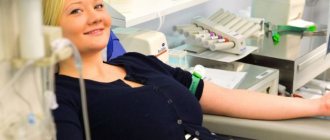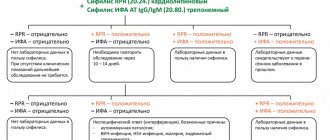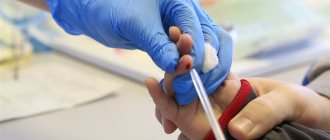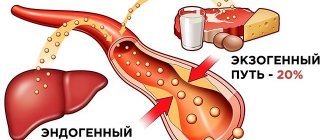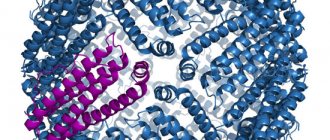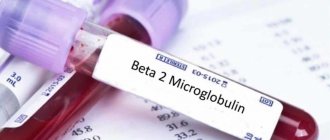Norms for TSH
It is important to remember that TSH fluctuations are especially individual for each person at different ages.
Therefore, an accurate interpretation of TSH tests (resolving the issue of whether TSH is low or increased) should only be carried out by a medical specialist. On average, the norm for TSH levels in adults is 0.23-4.90 mIU/l. For children aged 7-12 years, the TSH norm, on average, is in the range of 0.61-5.20 mU/l. For children under 6 years of age, the TSH norm ranges from 0.45-3.6 mU/l.
The average value and norm of TSH during pregnancy is 0.2-3.5 mU/l. In pregnant women, during some periods, it is considered normal when the TSH level is elevated to 5.6 mU/L.
Reasons for low TSH
A decrease in hormone levels is observed:
- with diffuse toxic goiter;
- thyrotoxic adenoma;
- postpartum necrosis of the pituitary gland;
- latent thyrotoxicosis;
- pituitary injuries;
- nervous breakdown or starvation due to diet;
- attempts to independently regulate the amount of T4 and the subsequent development of thyrotoxicosis.
A drop in TSH levels can be observed in pregnant women with hypothyroidism.
Changes in the direction of decreasing hormone levels occur when using certain medications. The list includes anabolic steroids, glucocorticosteroids, cytostatics, antihypertensive medications and other drugs.
Why is TSH low?
A decrease in TSH concentration in the blood may indicate:
• Deterioration of the pituitary gland function – after brain injuries, with hereditary diseases, infections, after severe bleeding;
• Hypothyroidism is a deterioration in the normal functioning and function of the thyroid gland, which may be associated with a tumor, iodine deficiency, protein deficiency, heredity, exposure to radiation and other reasons;
• Psychological stress;
• Abuse of thyroid hormones;
• Sheehan syndrome – partial death of cells in the pituitary gland in women after childbirth.
Causes of increased thyroid-stimulating hormone
Changes in the direction of increasing TSH levels may be associated with:
- with a benign neoplasm in the pituitary gland – thyrotropinoma;
- adenoma in the anterior pituitary gland;
- syndrome of resistance to hormonal elements of the thyroid gland;
- irregular production of thyrotropin;
- juvenile hypothyroidism, other formations in the pituitary gland;
- subacute thyroiditis;
- chronic pathologies, including mental illnesses;
- removal of the gallbladder, lead intoxication;
- excessive physical activity, hemodialysis procedures;
- preeclampsia.
The element may increase during therapy with certain medications:
- anticonvulsant action - during treatment with Benserazide, Phenytoin;
- beta blockers - Atenolol, Metaprolol;
- Morphine, Prednisone, Rimphapicin.
A similar deviation occurs during therapeutic procedures using iodides and Calcitonin.
When is a TSH test needed?
An analysis to determine TSH norms is needed in the following cases:
• Suspicion of hypofunction of the thyroid gland - lethargy, drowsiness, dry skin, constipation, chilliness, etc. An examination can help understand the cause of decreased function (to distinguish pathology of the thyroid gland from pathology of the pituitary gland);
• Suspicion of hyperfunction of the thyroid gland – a feeling of arrhythmia and tachycardia, diarrhea, nervousness, insomnia, menstrual irregularities, feeling of heat, weight loss, protrusion of the eyeballs from the orbits, etc.;
• Monitoring the results of treatment after removal of the thyroid gland (partial or complete);
• Monitoring the results of hormone replacement therapy for glandular diseases;
• Autoimmune diseases of the thyroid gland and control of their treatment;
• Diagnosis of suspected congenital hypothyroidism in a newborn.
Thyrotoxicosis (hyperthyroidism) - symptoms and treatment
In the treatment of thyrotoxicosis, the following basic methods are usually used:
- conservative drug treatment with thyreostatic drugs;
- radioactive iodine therapy (I 131);
- surgery;
- non-drug treatment (limiting physical activity, healthy sleep, quitting smoking, preventing stress).[5][11][12]
The fight against the syndrome involves eliminating the clinical manifestations of thyrotoxicosis with normalization of T3, T4 and TSH values and achieving stable remission of the disease.
Conservative therapy
In the conservative treatment of diffuse toxic goiter in patients with a moderately enlarged thyroid gland (up to 40 ml), propylthiouracil (PTU) or thiamazole (Tirozol or Mercazolil) is prescribed. This helps to achieve normal functioning of the affected organ. In case of diagnosed cases of diffuse toxic goiter in the first trimester of pregnancy and the occurrence of side effects while taking thiamazole, PTU is prescribed. As a result of treatment, after 4-6 weeks there is an improvement - the level of free T4 is normalized. Additionally, beta-blockers are prescribed according to indications (for example, 2.5-5 mg of Concor per day).
In severe cases, it is recommended to take glucocorticoids - up to 10-15 mg of prednisolone per day. Then, over 2-3 weeks, the dose of the thyreostatic agent is reduced to a maintenance dose (no more than 10 mg per day). In parallel, the patient is usually prescribed 50 mcg of levothyroxine per day. This treatment regimen is called “Block and Replace.”[3][6][7][10][12] Stable maintenance of normal levels of free T4 and TSH will indicate the adequacy of the prescribed therapy.
If there are persistent side effects of the prescribed treatment, thyreostatic drugs are canceled, radioactive iodine therapy or surgery is prescribed. In case of relapse of thyrotoxicosis, the question arises about the need for radioiodine therapy or thyroidectomy - complete or partial removal of the thyroid gland.[5][12]
Treatment with radioactive iodine
Radioiodine therapy for diffuse toxic goiter is carried out in case of persistent relapse of thyrotoxicosis after the end of properly administered conservative therapy (for 12-18 months) and difficulties in taking thyreostatic drugs (decrease in the number of leukocytes in the blood or the occurrence of allergic reactions).
Treatment with radioactive iodine is carried out in specialized centers with radiation and environmental safety for people and nature. The only contraindications for this therapy are pregnancy and breastfeeding.
The goal of radioiodine therapy in destroying hyperfunctioning thyroid tissue is to achieve a stable hypothyroid state.[3][6][7][10][12]
Surgical treatment
Surgical intervention for diffuse toxic goiter is necessary if the goiter is located behind the sternum, with diffuse and nodular forms of goiter with compression and the patient refuses other methods of therapy. Total and subtotal thyroidectomy are the treatment of choice. If there is a nodular formation in the thyroid gland, it is necessary to perform a puncture biopsy and diagnostic cytological examination.[4][5][12]
After the operation, levothyroxine preparations (Euthyrox, L-thyroxine) are prescribed at the rate of 1.7 mcg per kg of the patient’s weight. TSH determination is carried out 6-8 weeks after surgical treatment and over time.
Treatment of diffuse toxic goiter with concomitant endocrine ophthalmopathy is preferably carried out using the “Block and Replace” scheme.[5][10][12]
In the case of thyrotoxicosis with a TSH-secreting pituitary tumor (thyrotropinoma), the TSH level is diagnosed taking into account the levels of free T3 and T4, as well as MRI (as a result, a pituitary adenoma is usually detected). Such patients require surgical intervention.[3][6][7][10][12]
How often do you need to get tested for TSH, who and where?
TSH analysis is especially important for children and women when planning pregnancy, as well as during it. Any suspicion of hormonal disorders associated with the thyroid gland requires testing using hormone tests, including TSH.
It is imperative to monitor TSH for those who have already had problems with the thyroid gland before. According to the recommendation of the American College of Physicians, TSH testing should be done regularly for all women over 50 years of age, since this is a risk group for hormonal disorders due to the onset of hormonal changes in the body (entry into menopause).
You can get tested for TSH in almost any clinic or laboratory. However, only at LAB4U the affordable price of a TSH blood test is combined with high quality and accurate results.
Possible diseases
The growth of pituitary tissue is possible due to a tumor - adenoma. This is one of the rarest causes of elevated TSH levels in the blood.
The most common causes of elevated TSH:
- hypothyroidism - a lack of thyroid hormones, in response to which the pituitary gland produces more TSH;
- thyroiditis is an inflammation of the thyroid gland, including autoimmune inflammation, to which the pituitary gland reacts.
Diagnosis requires a large-scale examination, since without finding out the cause it is impossible to select a treatment.
MEDICAL CENTER
A pituitary hormone that regulates the functions of the thyroid gland. One of the most important tests in the laboratory diagnosis of thyroid diseases. .
TSH is a glycoprotein with a molecular weight of about 28 kDa. Synthesized in the anterior lobe of the pituitary gland. Activates the production and secretion of thyroid hormones (thyroid hormones), initiates cell growth and mitotic activity of thyroid cells. Synthesis and secretion of TSH are stimulated by thyrotropin-releasing hormone of the hypothalamus in response to a decrease in the level of circulating thyroid hormones. The level of TSH is in an inverse logarithmic relationship with the concentration of T4: as the level of T4 increases, the production of TSH decreases; as the level of T4 decreases, the production of TSH compensatory increases, which helps maintain the concentration of thyroid hormones at the required height. TSH secretion is influenced by various neuronal mechanisms and changes during sleep, low temperature, and nonspecific stress. TSH is characterized by daily fluctuations in concentration: blood TSH reaches its highest values at 2-4 a.m., high levels in the blood remain until 6-8 a.m., and minimum TSH values occur at 5-6 p.m. The reference values for TSH levels given below are applicable for outpatients in the period from 8 to 18 hours. The normal rhythm of thyrotropin secretion is disrupted when awake at night.
With clinically pronounced primary hypothyroidism (i.e., damage at the level of the thyroid gland, which leads to a decrease in its function), there is a significant increase in the level of TSH against the background of low levels of thyroid hormones. Primary hyperthyroidism, in contrast, is associated with decreased or undetectable TSH levels and high thyroid hormone levels. Determination of TSH levels makes it possible to identify subclinical stages of thyroid diseases, when the concentration of thyroid hormones is still maintained by regulatory mechanisms within the reference values. Typically, when screening for thyroid function, TSH is used as the only test or in combination with the determination of free T4.
Taking thyroxine preparations on the eve of taking blood for testing does not affect the concentration of TSH. Normalization of TSH levels during replacement therapy for hypothyroidism with L-thyroxine drugs occurs slowly (over several weeks and months), since in chronic severe hypothyroidism hyperplasia of thyrotrophs develops. The paradoxical combination - a high level of TSH and a high level of free T4 - during this period is an artificially induced (iatrogenic) condition. It is advisable to carry out repeated studies of TSH levels in order to monitor therapy no earlier than 6 weeks after changing the dose or type of drug.
In secondary and tertiary hypothyroidism associated with pituitary dysfunction due to pathology of the pituitary gland and hypothalamus, significantly reduced levels of T3 and T4 are combined with normal or slightly increased levels of TSH, which in these cases has reduced biological activity. Rare clinical cases of secondary hyperthyroidism may be due to TSH-secreting tumors.
Severe diseases not associated with thyroid pathology can cause a temporary change in TSH concentration. The cause may be the use of medications or the consequences of the disease itself. Typically, there is a decrease in TSH levels during the acute phase of the disease and a slight increase in levels during recovery. If necessary, in such cases, it is advisable to focus on the extended reference range of TSH (0.02-10 mU/l) and use a set of tests for TSH and T4 (or free T4).
Physiological changes in TSH concentrations are observed during pregnancy. High concentrations of human chorionic gonadotropin, which has a certain structural similarity to TSH, can have a stimulating effect on the synthesis of thyroid hormones. In the first trimester of pregnancy, a temporary increase in T4 levels and a decrease in TSH levels are observed. During the second and third trimesters, TSH levels return to normal. An elevated TSH level in early pregnancy may indicate latent maternal hypothyroidism, which is potentially dangerous for the development of the fetus.
Limits of determination: 0.0025 mU/l-100 mU/l
What can affect the results of a TSH test?
What can affect the results of a TSH test?
An analysis of TSH hormones is prescribed to assess the condition of the thyroid gland and the effectiveness of treatment of its pathologies, and to diagnose female infertility. For newborn babies, such a study is carried out to identify disorders of the thyroid gland. To correctly interpret the results, accurately diagnose and prescribe treatment, you must contact an endocrinologist.
Who is assigned to the study?
The TSH test is one of the most important hormonal tests, but in the vast majority of cases it is impossible to establish an accurate diagnosis and select effective treatment based on its results alone. Usually doctors prescribe it in combination with tests for T3 and T4, sometimes additional examination may be required.
Endocrinologists recommend checking the TSH level if the patient has an increase in the size of the thyroid gland or symptoms of hypothyroidism or hyperthyroidism. To monitor the effectiveness of treatment, analysis is prescribed at certain intervals.
Reasons for deviations from the norm
An increase and decrease in TSH levels often indicates the presence of pathologies of the thyroid gland, pituitary gland or hypothalamus. In such cases, the doctor prescribes an additional examination to confirm the preliminary diagnosis and select the most effective treatment.
Sometimes test results that deviate from the norm are not a sign of pathology. The production of hormones is influenced by taking many medications (for example, furatsilin, rifampicin, valproic acid). Also, a deviation from the indicators can be observed if the patient has recently suffered an infectious disease or has been exposed to severe stress in the last 24 hours. Excessive physical activity (hard physical labor, intense sports training) can also affect hormone levels. Recent studies have shown that the concentration of the hormone in the blood is subject to daily fluctuations (its level decreases in the evening hours). If the patient donated blood for testing in the afternoon, it is important to inform the doctor who will interpret the results.
If you need to take a blood test for TSH, contact the CITILAB laboratory. Here you can get examined in a comfortable environment without having to waste time waiting in queues. To make an appointment at a convenient time, leave a request on the website or contact the laboratory staff by phone.
